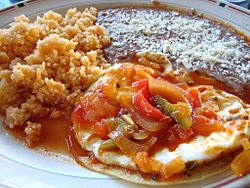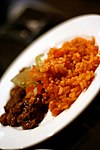Huevos rancheros
 | |
| Course | Breakfast |
|---|---|
| Place of origin | Mexico |
| Main ingredients | Tortillas, eggs, tomato-chili sauce, refried beans, rice, avocado or guacamole |
Huevos rancheros (Spanish pronunciation: [ˈweβoz ranˈtʃeɾos], 'ranch-style eggs') is a breakfast dish consisting of eggs served in the style of the traditional large mid-morning fare on rural Mexican farms.[1][2]
Basic dish[]
The basic dish consists of fried eggs served on lightly fried or charred corn or flour tortillas topped with a pico de gallo made of tomatoes, chili peppers, onion, and cilantro. Common accompaniments include refried beans, Mexican-style rice, and guacamole or slices of avocado, with cilantro as a garnish.[3]
Variants[]
As the dish spread beyond Mexico, variations using wheat flour tortillas instead of corn, and pureed chili or enchilada sauce instead of tomato-chili pico de gallo, have appeared.[3] Non-Mexican additions such as cheese, sour cream, and lettuce also have become common additions beyond the dish's native range.[4]

"Huevos divorciados" (divorced eggs) are simply two eggs served in the same style as huevos rancheros but with a different sauce for each egg – usually a salsa roja and a salsa verde.[5]
Similar dishes are huevos motuleños of Yucatan[6] and New Mexican enchiladas montadas.[7]
Another variation, "" or drowned eggs, is a traditional Mexican breakfast of eggs poached in a tomato-chile salsa.[8]
See also[]
Notes[]
- ^ Kuhn, Shannon (April 4, 2013). "Another day at the ranch". Anchorage Press. Archived from the original on August 6, 2014.
- ^ Lin, Andrea (February 17, 2012). "Good Morning, Sunshine". Albuquerque Journal.
- ^ a b John Tissot (1998). Around the World on a Breakfast Tray. Nova Publishers. pp. 59–61. ISBN 9781560723219. Retrieved 14 June 2018.
- ^ Victoria Wise & Susanna Hoffman (1990). The Well-filled Tortilla Cookbook. Workman Publishing. p. 234. ISBN 9780894803642. Retrieved 14 June 2018.
huevos rancheros.
- ^ Dona Savitsky & Thomas Schnetz (2006). Dona Tomas: Discovering Authentic Mexican Cooking. Random House Digital, Inc. pp. 42–44. ISBN 9781580086042. Retrieved 26 November 2012.
- ^ Rick Bayless, JeanMarie Brownson & Deann Groen Bayless (1996). Rick Bayless's Mexican Kitchen. New York, New York (USA): Scribner. pp. 270–271. ISBN 978-0684800066.
huevos motuleños.
- ^ DeWitt, Dave. "How to order enchiladas in Santa Fe". Fiery Foods (blog). Archived from the original on 2012-03-06. Retrieved 6 August 2010.
- ^ Ingrid Hoffmann (2013). Latin D'Lite: Deliciously Healthy Recipes With a Latin Twist. Penguin. ISBN 9781101615263. Retrieved 14 June 2018.
References[]
- Leonard, Jonathan Norton, (1968) Latin-American Cooking, Time-Life Books
- Ortiz, Elizabeth Lambert, (1967) The Complete Book of Mexican Cooking, M. Evans and Co. ISBN 0-87131-333-2
- Paddleford, Clementine, (1960) How America Eats, Charles Scribner's Sons
External links[]
| Wikibooks Cookbook has a recipe/module on |
- Huevos Ahogados-Hispanic Kitchen
 Food portal
Food portal
- Cuisine of the Southwestern United States
- Egg dishes
- Mexican cuisine
- New Mexican cuisine
- Tortilla-based dishes









